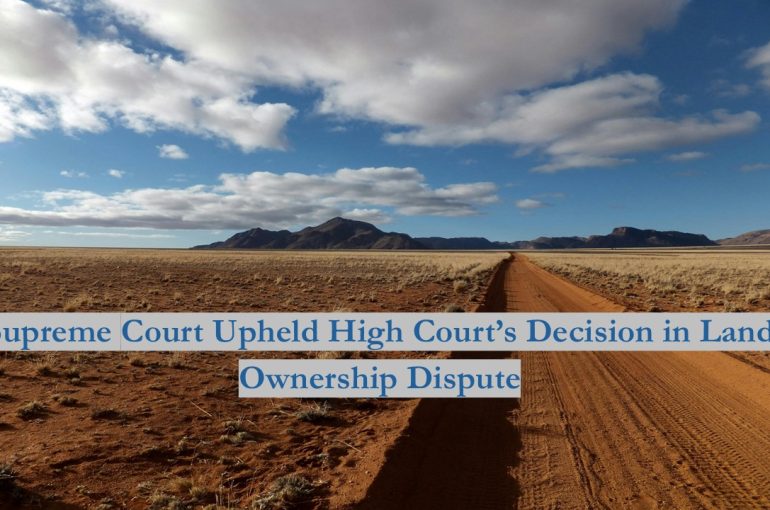Supreme Court Upholds High Court’s Decision in Land Ownership Dispute
The Judgment in the Case of M/s Maxim India Integrated Circuit Design (P) Ltd. Versus Andappa (D) By LRs &Ors.(Civil Appeal Nos. 3650-3655 of 2018, with Civil Appeal No. 3656 of 2018) was delivered by a Division Bench of the Supreme Court of India, comprising Hon’ble Justice C.T. Ravikumar and Justice Sanjay Kumar, on 2nd January 2025. This Case involves a series of appeals filed by M/s Maxim India Integrated Circuit Design (P) Ltd. against various orders passed by the High Court of Karnataka in matters concerning land disputes and property ownership. The primary issue revolves around the validity of certain decisions related to the mutation of land records and the Appellant’s claim over a property that had a long history of legal disputes and transactions.
Facts of the Case:
The Appellant, M/s Maxim India Integrated Circuit Design (P) Ltd., filed a series of appeals against the common judgment passed by the High Court of Karnataka on February 26, 2010. The Appellant, a 100% owned subsidiary of Maxim Integrated Products, USA, claimed ownership of a property in Survey No. 1/3 (previously Sy. No. 49/43-A) measuring 46,995 square feet, which forms part of a larger 2-acre, 29-gunta property. This land had originally been purchased by Messrs Chinnappa and Munniappa from Sri. Munivenkatappa. Following Chinnappa’s death, his rights were inherited by his legal heirs, including D. Munniappa and AC Munniappa. Subsequently, the first Respondent, Andappa, along with another person, filed a tenancy petition for land in Survey No. 49/43, which was dismissed by the Land Tribunal in 1981. In a series of transactions, the land was eventually sold to Basant Kumar Patil, who sought mutation of the property in his name but faced legal challenges from Andappa. After a series of legal proceedings, including appeals and remands, Basant Kumar Patil sold the land to the Appellant on September 15, 2004. However, Andappa filed a suit seeking a permanent injunction against the Appellant, claiming that the Appellant was trying to dispossess him and his son from the property. This dispute resulted in multiple writ petitions and Appeals, including one filed by Andappa against the dismissal of his mutation claim, which led to the present set of Appeals in the Supreme Court.
Issues:
- Whether the High Court erred in dismissing the Appellant’s Writ Appeals and allowing the Respondent’s claims over the property.
- Whether the delay of 1378 days in filing a Writ Appeal was justifiably condoned by the High Court.
- Whether the Appellant, as a subsequent purchaser, should have been included as a party to the proceedings regarding the mutation of land records.
Contentions by Both Parties:
Appellants Contentions:
The Appellant argued that the High Court wrongly dismissed their Appeals, thereby ignoring the finality of previous orders passed by the Karnataka Land Reforms Tribunal. The Appellant also contended that it was unjustly denied the opportunity to oppose the Respondent’s claims in the Writ Appeals, especially after the condonation of such an inordinate delay in filing.The Appellant maintained that the Respondent’s claim was based on outdated and resolved tenancy issues.
Respondents Contentions:
The Respondent No 1, Andappa, argued that he had legitimate rights over the property due to his historical possession and claims under the Karnataka Land Reforms Act. The Respondent also contended that the Appellant had no legal standing as the property transaction took place after the disputes had begun, and he had not been made a party to the case earlier.
Supreme Court
The Apex Court, after considering the legal submissions, dismissed the Appeals filed by the Appellant. It upheld the High Court’s decisions, ruling that the High Court had rightly condoned the delay in filing the Writ Appeal, and the Appellant’s claims over the property were found to be without merit due to prior resolutions in the matter. The Court emphasized the finality of previous orders and the Appellant’s lack of a legal right to oppose the Respondent’s claim.
Baddam Parichaya
Legal Associate
The Indian Lawyer
If you want to learn more on the impact of Lease Agreements visit our YouTube channel The Indian Lawyer Legal Tips on the link below –





































Leave a Reply